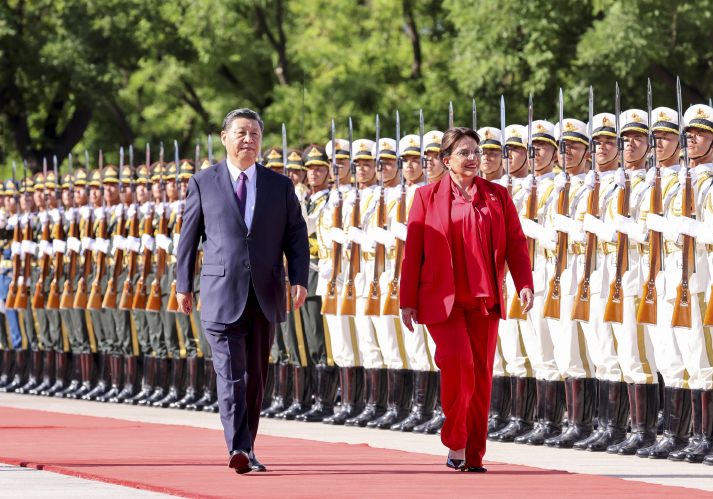| World |
| China and Honduras begin a new chapter in bilateral ties | |
|
|
 Chinese President Xi Jinping hosts a welcome ceremony for visiting Honduran President Iris Xiomara Castro Sarmiento prior to their talks in Beijing on June 12 (XINHUA)
On March 26, China and Honduras signed a joint communiqué on the establishment of diplomatic relations. On June 11, an inauguration ceremony for the Honduran Embassy in China was held. On June 12, Chinese President Xi Jinping held talks with visiting Honduran President Iris Xiomara Castro Sarmiento at the Great Hall of the People in Beijing. While talking with Castro, Xi said the bilateral relationship has gotten off to a good and speedy start and enjoys great dynamism and broad prospects. "I believe that under joint efforts from the two sides, the China-Honduras relationship will experience sound and steady development, sailing into a bright future," he added. The first female president of Honduras paid a state visit to China from June 9 to 14. Xi extended a warm welcome to Castro and hailed her visit as one of special significance as it opens a new chapter in the annals of the China-Honduras relationship.  Honduran journalists visit the International Press Center of the Ministry of Foreign Affairs (MFA) in Beijing on June 14. Counselor Wang Xiaolin of the MFA's Information Department gifted the delegation selected books from China (WEI YAO)
Promoting ties Back on March 25, the Honduran foreign ministry announced that Honduras was severing its so-called "diplomatic relations" with the Taiwan authorities. The following day, Chinese State Councilor and Foreign Minister Qin Gang and Honduran Foreign Minister Eduardo Reina signed the joint communiqué following bilateral talks. A recent Associated Press report said "the ties formed in March were a diplomatic victory for China amid heightened tensions between Beijing and the United States... It also signaled China's growing influence in Latin America..." The U.S. should welcome positive Sino-Honduran relations, Josef Gregory Mahoney, a professor of politics and international relations at East China Normal University, told Beijing Review. Honduras suffers from chronic underdevelopment, violence and destabilizing migrations, for which the U.S. bears some historical responsibility but has an inability at this point to help resolve, Mahoney said, adding that "if China can help Honduras develop through the Belt and Road Initiative (BRI) through increased trade and so on, then this will benefit everyone in the region, including the U.S." The BRI is a China-proposed initiative that aims to boost connectivity along and beyond the ancient Silk Road routes. "This new era of China-Honduras relations promises a win-win-win outcome that all should encourage and support," Mahoney said. The historic meeting between Xi and Castro took place less than three months after the signing, demonstrating the great importance the two sides attach to enhancing ties. Their consensus will inject strong impetus into future bilateral relations, Song Junying, head of the Department for Latin American and Caribbean (LAC) Studies at the China Institute of International Studies, told Xinhua News Agency. "China will remain committed to developing friendly relations with Honduras, firmly support economic and social development in Honduras, and forge a good friendship and partnership with Honduras featuring mutual respect, equality, mutual benefit and common development," Xi said during their talks. Regarding the deepening of political mutual trust, Xi said the one-China principle was the primary prerequisite and political foundation for the establishment of diplomatic ties and the development of bilateral relations between China and Honduras, and it is believed that Honduras will act upon it faithfully. Castro, for her part, said Honduras firmly supports and abides by the one-China principle as well as supports efforts from the Chinese Government to realize national reunification. China is ready to strengthen exchanges of experience on state governance, share experience in poverty eradication, social governance and corruption punishment, and encourage exchanges and cooperation among governments, legislatures, political parties and subnational sectors, Xi added. The Honduran side firmly believes that friendly cooperation with China will bring Honduras more and better development opportunities, and the country looks forward to strengthening cooperation with China in such areas as trade, investment, infrastructure and people-to-people exchanges, Castro said. Exchanges and cooperation between the two peoples were taking place even before the official relationship was established, Han Han, a researcher with the Chinese Academy of Social Sciences (CASS) Institute of Latin American Studies, told Beijing Review. For instance, in 2015, Chinese and Honduran archaeologists initiated a project to jointly decipher the ancient mysteries of the Mayan civilization using the latest archaeological techniques and technologies. Chinese archaeologists first traveled to the Mayan site of Copán in Honduras that same year and have been collaborating on the ongoing project ever since. The Central American country is well known for being one of the centers of the Mayan civilization, one of the world's oldest civilizations which dates back more than 5,000 years, making the project an effective channel for promoting cultural exchange and mutual learning. Moreover, a new joint archaeological project between China and Honduras is set for 2024, according to the CASS Institute of Archaeology. China will send three archaeologists to Honduras and start the next round of archaeological work. The Patuca III Hydroelectric Plant in Olancho, Honduras, one of the most modern hydroelectric power plants in Central America, was built by the Power Construction Corp. of China (PowerChina). The plant has an installed capacity of 104 megawatts and an average annual power generation of 336 million kilowatt-hours (kWh), meeting around 6 percent of the country's power demand. Its construction started in 2015 and it was connected to the national grid in December 2020. "The plant has upgraded the country's infrastructure and promoted bilateral cooperation in green energy and technical engineering," Han said. In 2019, PowerChina was also contracted to build the Arenal hydropower project in Honduras, which is expected to generate 360 million kWh every year and provide electricity to about 1 million residents in three provinces of the country.  A Chinese archaeologist with the Chinese Academy of Social Sciences Institute of Archaeology talks with a Honduran expert at the Mayan site of Copán in Honduras on June 8 (XINHUA)
Seeking opportunities "China has been an important trading partner of Honduras since long before the establishment of diplomatic relations, so the fact is that Honduras and China have been working together for a long time," Reina said in a recent interview with Xinhua. According to the General Administration of Customs of China (GACC), trade volume between China and Honduras in 2022 was $1.59 billion, of which China exported $1.56 billion to and imported $29.24 million from Honduras. Despite their difference in size, the two economies are highly complementary, Song said, adding that cooperation in various fields between the two sides thus enjoys huge potential and broad prospects. For example, some of Honduras' agricultural products, such as coffee and aquatic products, can now be exported to China more easily and smoothly, he said. China will promote the early introduction of Honduran specialty products to the Chinese market and is willing to start the negotiation process for a free trade agreement at an early date, Xi said to Castro. On June 12, the GACC announced that China and Honduras had signed a protocol on inspection, quarantine and other requirements for aquatic products exported from Honduras to China, allowing the entry of Honduras' white-leg shrimp into the Chinese market. Recently, the GACC has given the green light to nine Honduran aquaculture enterprises to register in China for carrying out the trade of white-leg shrimp. "A stable trade mechanism can lead to broader and more secure cooperation," Han said, adding that Honduras is also looking forward to obtaining new technologies from China to upgrade its agriculture and fisheries. Infrastructure in Honduras is also expected to be further improved through bilateral collaboration, as the two countries signed a memorandum of understanding on jointly promoting the BRI on June 12. According to Han, the initiative is an open platform for multilateral cooperation and also helps reduce risks for developing countries. In recent years, a number of landmark early results have been made between China and other participating countries under the BRI framework, she said. Reina said the BRI will not only benefit the Honduran people with new opportunities for development, investment and infrastructure construction, but also help connect the world. In her talk with the Chinese President, Castro also expressed the country's willingness to be a member of the BRICS-led New Development Bank (NDB) after she visited the headquarters of the bank in Shanghai on June 11. The NDB, inaugurated in 2015, has become a new player in financial globalization by supplementing the efforts of multilateral and regional financial institutions for global development. Since its establishment, the bank has approved 98 projects in its member countries, with a total investment of about $33.2 billion. In recent years, China has established diplomatic relations with more LAC countries and set up a number of cooperation mechanisms, which have encouraged other countries in the region to seek cooperation, Han said, adding that pragmatic cooperation with China has led to tangible benefits for these countries. LAC countries want to be more connected to Asian countries and more emerging markets, Han explained. At the same time, traditional world financial mechanisms usually hold high barriers as well as interest rates. Against the backdrop of the sluggish global economy and trade, the NDB may bring more possibilities for cooperation and growth, she added. (Print Edition Title: Future-Oriented Relationship) Copyedited by G.P. Wilson Comments to mamm@cicgamericas.com |
|
||||||||||||||||||||||||||||||
|
